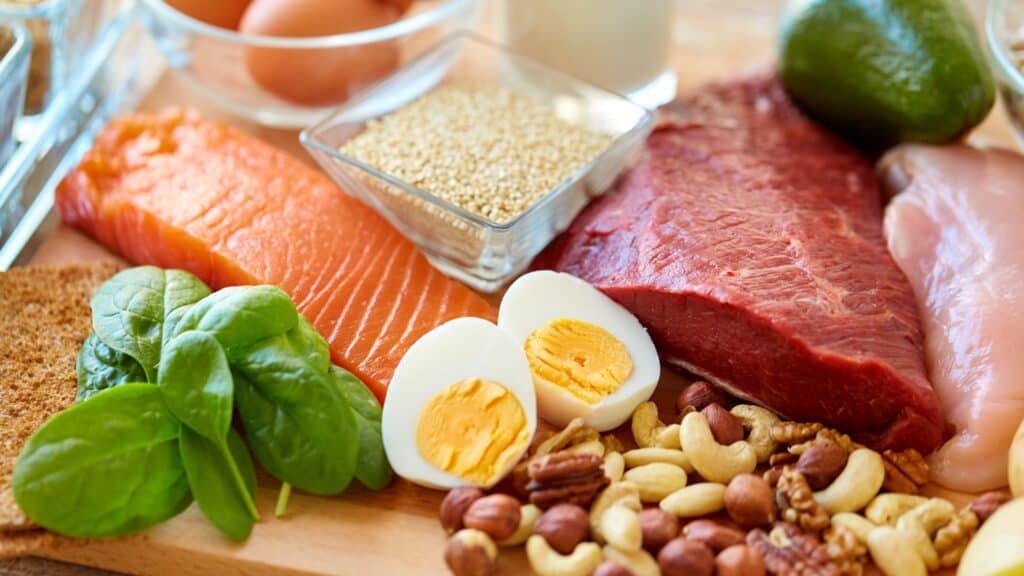As an athlete or a running enthusiast, building and maintaining lean muscle mass is crucial for your physical endurance and overall performance. And while, besides exercise, it is widely acknowledged that diet is a significant factor in gaining and preserving lean muscle mass, navigating nutrition can be overwhelming.
With so much information and a plethora of diets at your disposal, it is easy to get lost.
To build muscle and gain strength, it’s essential to maintain consistent and adequate nutrition and fitness habits. Regardless of your specific goals, you can make adjustments to both your diet and activity level to reach those milestones.
This blog post will simplify things by focusing on the crucial nutrition for building and maintaining lean muscle mass. So, grab a glass of water, and let’s dive in.

Which Nutrients Are Needed For Building And Maintaining Lean Muscle Mass?
As a runner, you understand how important it is to maintain your lean muscle mass. In addition to giving you the strength and endurance you need to keep going, your muscles play a vital role in your overall fitness and health.
But what nutrients should you be consuming to build and maintain lean muscle mass?
1. Proteins build lean muscle mass
Dietary protein, particularly essential amino acids, and leucine, plays a crucial role in building muscle by stimulating protein synthesis and preventing the breakdown of existing muscle during workouts.

While it’s possible to meet your daily protein needs through whole foods, supplements like protein powders, shakes, and bars can be convenient, especially when aiming to build muscle or engage in sports.
Protein sources include:
- Lean meats
- Turkey and chicken breast
- Beans and legumes
- Salmon and tuna
- Eggs
- Soybeans and tofu
- Yogurt, cottage cheese, low-fat, or nonfat milk
To maximize muscle-building benefits, choose for protein-rich foods that are rich in leucine. Great choices include beans, cottage cheese, and eggs whenever available.
2. Fueling Your Workouts with Carbs
Carbohydrates are an essential nutrient that plays a crucial role in providing energy for demanding workouts. The absence of carbohydrates can hinder the effectiveness of your resistance training sessions.
To maximize your muscle-building potential, it’s essential to incorporate carbohydrates into your pre and post-exercise nutrition. By doing so, you provide your body with the necessary fuel to perform at its best during workouts and promote muscle recovery and growth after exercise.
Choose nutrient-dense sources of carbohydrates that help sustain glycogen stores, enabling longer and more effective workouts.
Carb sources include:
- Whole wheat bread, oats, and rye
- Pasta
- Quinoa
- Buckwheat
- Legumes
- Root vegetables
- Starchy vegetables
- Sweet potatoes
- Winter squash
- Fruit
These options boost your energy and help muscles recover, making your intense workouts more effective as well as allowing you to be ready for the next workout.
3. Healthy Fats
Dietary fats, while not the primary muscle-building factor, play crucial roles in maintaining hormonal function and supporting a healthy immune system. Excluding fats entirely from your diet can hinder muscle growth, especially for individuals engaging in vigorous exercise.
It’s worth noting that healthy fats go beyond olive oil. Consider incorporating various sources into your diet, both for cooking and consumption:
- Whole eggs
- Fish
- Avocados
- Dark chocolate
- Nuts and chia seeds
- Flaxseeds
- Olives
- Ghee
- Greek yogurt
These sources not only contribute to overall well-being but also complement your muscle-building efforts by providing essential nutrients.
When it comes to building and maintaining muscle mass, most people immediately think of protein and carbohydrates. However, we often forget about the other important nutrients that contribute to muscle health. Vitamins and minerals play a significant role in this process, and their absence can hinder our fitness progress.
4. Calcium: The bone builder
Calcium is essential for building strong bones, but it also plays a vital role in muscle function. Calcium helps with muscle contractions, which is vital for strength-based exercises.
If you don’t consume enough calcium, your body will start breaking down bone tissue to get the required amount, which can lead to weaker bones and muscles.
Moreover, calcium can also help reduce muscle soreness after exercise. It’s recommended to consume 1,000-1,200 mg of calcium per day. Good sources of calcium include dairy products, leafy greens, tofu, and fortified products.
4. Vitamin D: The sunshine vitamin
Vitamin D is essential for calcium absorption, which is necessary for muscle and bone health. Moreover, vitamin D also has direct effects on muscle tissue. It can help improve muscle strength, reduce inflammation, and prevent muscle damage.
It’s recommended to get sunlight exposure or take supplements to maintain adequate vitamin D levels. The recommended daily intake of Vitamin D is 600-800 IU per day.
Sources of vitamin D include fatty fish, egg yolks, mushrooms, and fortified foods.
5. Creatine: The muscle fuel
Lastly, creatine is a muscle fuel that can help increase lean muscle mass, strength, and performance. It’s naturally present in our muscles and can also be obtained from animal products, such as red meat or fish, and supplements.
Creatine supplements can help increase muscle creatine content, leading to improved muscle performance during high-intensity exercise and resistance training.
However, it’s important to note that creatine supplements may not be suitable for everyone and should be used with caution, especially for people with kidney problems.

Best Nutrition Tips for Building and Maintaining Lean Muscle Mass
How Often Should I Eat?
To boost your workout nutrition, schedule your meals around your exercise times. Aim for three main meals and a couple of snacks each day, ensuring a good balance of carbohydrates and protein in each.
This strategy not only provides your body with essential energy from carbohydrates but also sustains a steady protein source. This helps continuously stimulate muscle protein synthesis, contributing to the achievement of your fitness objectives.
What Should I Eat Before A Workout?
To begin your workout, it’s important to be properly hydrated and fueled. For fluids, consume approximately 2 cups of water 2-3 hours before, and another cup about 15-20 minutes prior to starting. The duration between your meal and workout determines the ideal type of meal:
If you have several hours to digest before your workout, opt for a “regular” breakfast. This could include foods like whole-grain toast, whole-grain cereals, eggs, yogurt, milk/soy milk, and fruit.
Consider a quicker-digesting option like a protein shake if your meal is closer to your workout. Ensure your shake includes not only protein but also a source of carbohydrates.
In addition to protein powder and/or milk or milk alternatives, incorporate foods like fruits and vegetables (such as carrots or sweet potato). You can even add some rolled oats for a balanced combination.
How long does it take to build muscle? Can I build muscle quickly?
Building muscle is a gradual process, and it’s important to follow a suitable program that fits your lifestyle and fitness level. Two key factors for success are giving your body enough rest and maintaining good nutrition.
When you do everything correctly, you’ll start feeling stronger in the 6th to 8th week of your strength program. During this time, you’re experiencing neuro-muscular gains, meaning your body is getting used to the movements and weights, and your muscles are becoming more coordinated.
Making sure you do the correct strength training is important. The good news is we’ve created a free strength training plan for runners that you can download by clicking here.
Even if you don’t see big changes in your appearance, your brain-to-muscle signals are improving!
As you continue with your training, around the 12th week, and if you’re taking proper rest and eating well, you’ll begin to see your muscles growing. This is when you might notice your clothes fitting differently. It’s a sign that your hard work is paying off!
What Should I Eat After A Workout?
After you exercise, your muscles need some healthy carbohydrates and about 10-20 grams of high-quality protein to help them repair and recover.
A carton of yoghurt, a turkey or nut butter sandwich, a smoothie made with fruit and milk or soy milk, or a bowl of cereal and fruit are all good recovery foods after a session of strength training.
Choosing the right snacks between meals is important for a healthy balance. Some snack bars have a good mix of protein and carbohydrates, and they’re easy to take with you on the go.
Quick snacks can also be a hard-boiled egg with whole grain crackers, yoghurt or cottage cheese with fruit, or raw vegetables with hummus. These options provide the nutrients your body needs to stay fueled and satisfied between meals.
We recommend a 4:1 ratio of carbs to proteins. 4 carbs to 1 protein.
How Can I Build Muscle Without Gaining Fat
To make muscles, your body needs more nutrients and calories, but that doesn’t mean you can eat anything you want. If you eat more calories than your body uses, whether from unhealthy, fatty, or sugary foods or a healthy balanced diet, those extra calories will turn into body fat.
To avoid this, pick lean proteins like fish, poultry, low-fat dairy, beans, and tofu. This way, your body gets the protein it needs without too many calories.
Also, go for healthy carbohydrates like fruits, veggies, and whole grains instead of sugary or processed starches. This helps you get the benefits without adding extra calories.
Stay Hydrated
Staying hydrated is crucial for muscle growth and recovery because muscles are mostly made up of water, about 75%. Drinking water regularly helps keep muscles hydrated and flexible, supporting endurance and preventing damage.
It’s recommended for people to drink at least eight 8-ounce glasses of water each day. Dehydration can stress the body, impede muscle growth, and lead to fatigue.
Consistency Is Key
Achieving nutrition and fitness goals is a gradual process that requires patience and ongoing effort. Change doesn’t happen overnight, and results may vary from person to person. It’s essential to trust the process, be patient, and maintain consistency for muscle gain, fat loss, and overall well-being.
Follow these tips to enhance your consistency:
- Develop a weekly menu or meal plan.
- Regularly check pantry items and restock weekly.
- Prepare meals and snacks ahead of time.
- Save time by cooking in bulk, like preparing chicken breast, rice, and vegetables.
- Don’t skip meals.
- Consider finding a workout and meal prep partner for mutual support.
- Give importance to rest, ensure quality sleep, and prioritize proper recovery.
- Explore convenient options like grocery delivery, meal prep services, and supplements.
Timing Meals
Timing your nutrition is vital for building and preserving lean muscle mass. It’s highly advisable to have a well-balanced meal or snack within 30 minutes after your workout, focusing on the right combination of sugars and protein. This becomes even more critical as we age. Additionally, staying adequately hydrated plays a crucial role in accelerating your recovery time.
Why should it be within 30 minutes?
The 30-minute window is crucial for effective post-exercise nutrition because of the presence of what we call gated channels. These channels help with the transfer of sugar from the blood, across membranes, and into the muscles during physical activity.
They are highly sensitive during exercise but gradually close down, slowing the process of transporting sugar into the muscles once the 30-minute window elapses.
To elaborate, our body’s efficiency in replenishing muscle glycogen decreases by approximately 50% every 15 minutes beyond this window. After 45 to 60 minutes post-exercise, it becomes challenging for the body to efficiently reload muscle glycogen.
We recommend chocolate milk as a recovery drink secret. Chocolate milk contains milk, which is rich in the amino acid leucine, crucial for recovery, especially in older athletes. Additionally, the chocolate component provides ample sugar, enhancing the overall recovery benefits.
Get Enough Rest
While not technically a nutrient, rest is one of the most important things you can do to maintain healthy lean muscle mass. When you engage in strength training or other muscle-building activities, you’re actually breaking down muscle tissue.
It’s during rest periods that your body repairs and rebuilds that tissue, leading to stronger muscles. Be sure to get plenty of sleep each night, and to take rest days between workouts to give your muscles time to recover.
In conclusion, maintaining lean muscle mass is essential for athletes and running enthusiasts. It takes more than just daily exercise; nutrition plays a crucial role too. The tips discussed above provide a foundation for a muscle-building diet.
Staying hydrated and consuming adequate protein, healthy fats, and carbohydrates at the right time can build and preserve lean muscle mass. Remember, muscles are not built overnight, consistency, patience, and discipline are required for positive results to be achieved.



Comments are closed.